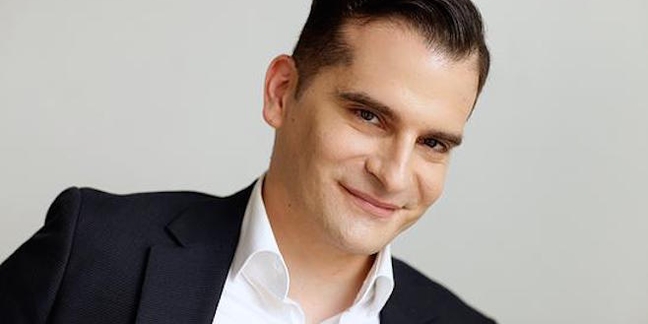
Carlos D Is a Professional Actor Now, Gives Long Interview About Post-Interpol Life

Carlos Dengler, aka Carlos D, who was a founding member of Interpol, left the band back in 2010. This week, Bedford + Bowery tracked him down for a wide-ranging interview about his post-Interpol career, as Brooklyn Vegan points out.
Dengler said he recently graduated from NYU’s graduate acting program, where he spent “three years in acting boot camp.” Now, after acting in a few plays, he’s begun looking for more work.
Dengler said he’s “auditioning and looking for an agent,” while settling into his “adult, post-Interpol, post-actor training life”:
I’m a 41-year-old man. I’m no spring chicken. So I’m looking at some of my younger classmates and how they’re coming out of the gate with fire under their asses and they’re doing a lot of stuff. I’m like, “Wow, that’s pretty fucking impressive.” I just don’t have that ability right now. I’m still putting all of the pieces together.
Throughout the interview, Dengler was explicit about his decision to escape his reputation as Interpol’s reigning bon vivant. He said his history with the band goes unnoticed until he mentions it:
One thing I’m discovering about getting out there right now– this is the first time I’m out of school since leaving the band, and I’m completely starting over. Nobody in the theater community really knows about my band. They don’t really know. I have to tell them. I have to kind of lead with that, which I don’t like doing. So it’s a problem.
He also said he doesn’t want to get a part just because he was in Interpol:
I don’t want to ever get a gig because the director’s like a fan of Interpol or something like that. I would construe that as a fundamentally corrupting ingredient in the mix. I might be naive or idealistic in wanting this, but it’s an ideal. I want to do this for the art, for the art.
Later on, he explains his decision to leave the band:
I was not really mentally all that well while I was in Interpol. I had many substance and process addictions that I was coping with. And I was, you know, the classic VH1 “Behind the Music” story of upward rise and downward fall. The only difference was that— because I didn’t have such a good relationship with my bandmates— I wasn’t willing to be in the band with them while I experienced my crash.
There was a little crash before the third record [2007's Our Love to Admire] but the big crash actually came afterwards. One of the reasons why it was necessary for me to be out of the band to experience that crash was because I wasn’t, at the time, willing to let anybody know about it. I didn’t want anyone in the music industry to see me fall that way. It was beyond anything, like, that I would want anyone to know about. It shook my very belief in the career I was even pursuing inside of music.
As for his relationship with the other members of Interpol, Dengler said:
I don’t like phrase “we don’t talk.” That’s sort of like someone hammering a plaque into a rock and engraving it: “Thus they do not speak, in perpetuity.” And it’s a much more fluid situation than that. The fact of the matter is that I have not spoken to them in quite some time.
I haven’t spoke to Sam [Fogarino] or Paul [Banks] since I left the band, since I actually left our group counseling session together, which is where I announced that I was leaving. That was the last time that I saw them in the flesh. I saw Daniel [Kessler] a couple times after that— we actually met up— and then as things got more serious with my training, I just wasn’t ready to continue the friendship.
Additionally, he said he’s working on a book (“I don’t want to make it a straight-up, tell-all memoir, I wanted it to be more of an essay and more literary”) and a one-man, autobiographical show modeled after Spalding Gray and Mike Daisey. “I’ve workshopped it quite a bit and I’m going to workshop it one more time at Stella Adler Studio of Acting,” he said. “And I anticipate I will have it in somewhat more of a finished form soon.”
Read the whole interview here. Back in 2012, Dengler participated in Pitchfork’s oral history of Interpol’s album Turn on the Bright Lights.













Recent Comments